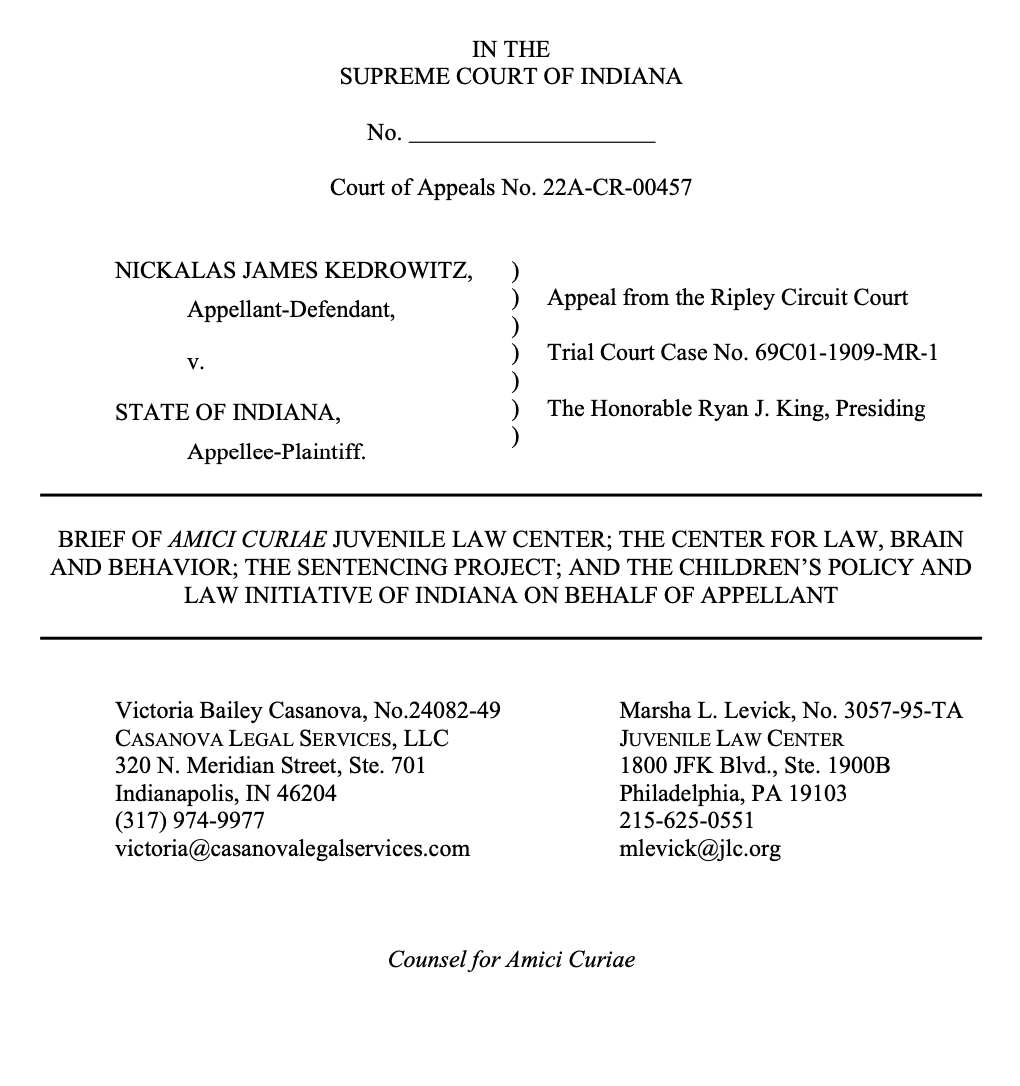
Summary of Argument
Amici write to provide this court with developmental context on why a 100-year aggregate life sentence imposed on a child is constitutionally impermissible. Youth are developmentally different from adults, which makes them less culpable for the purpose of sentencing, gives them greater prospects for reform, and makes them less deserving of the most severe sentences. A 100- year aggregate sentence is an unconstitutional de facto life sentence—different from a mandatory life without parole sentence only in name. As such, the constitutional protections mandated by the Supreme Court in Miller v Alabama must be applied.
Summary of Argument
The imposition of a 100-year aggregate life sentence on a juvenile offender raises significant constitutional concerns due to the developmental differences between youth and adults. This article argues that such sentences are tantamount to de facto life sentences and should be subject to the same constitutional protections afforded to mandatory life without parole sentences under Miller v. Alabama.
Developmental Differences
Reduced Culpability: Juveniles possess diminished cognitive abilities, underdeveloped impulse control, and a greater susceptibility to peer influence, rendering them less culpable for their actions than adults.
Enhanced Potential for Rehabilitation: Youth have a greater capacity for change and rehabilitation due to their ongoing brain development and malleability.
Diminished Deservingness of Severe Punishment: The immaturity and potential for growth of juveniles make them less deserving of the most severe punishments reserved for adult offenders.
A 100-year aggregate sentence, while technically distinct from a mandatory life without parole sentence, effectively functions as a de facto life sentence. The extreme length of the sentence forecloses any meaningful opportunity for release and denies the juvenile the possibility of redemption.
In Miller v. Alabama, the Supreme Court held that mandatory life without parole sentences for juveniles violate the Eighth Amendment's prohibition against cruel and unusual punishment. The Court recognized the developmental differences between youth and adults and the need for individualized sentencing that considers their potential for rehabilitation.
The constitutional protections mandated by Miller v. Alabama must be extended to 100-year aggregate sentences imposed on juveniles. These sentences are de facto life sentences that fail to account for the unique developmental characteristics of youth and violate the Eighth Amendment's prohibition against cruel and unusual punishment.
Summary of Argument
Young people are different from adults in important ways that affect how they should be sentenced for crimes. Here are the key points:
Less Culpable: Youth are less mature and have less developed decision-making abilities, making them less responsible for their actions.
Greater Potential for Rehabilitation: Young people have a higher capacity for change and growth, making them more likely to benefit from rehabilitation.
Less Deserving of Severe Punishment: The most severe sentences should be reserved for the most serious offenders. Children, due to their developmental differences, are less deserving of such harsh punishments.
A 100-year sentence for a child is essentially a life sentence without the possibility of parole. This is unconstitutional because it fails to recognize the developmental differences between children and adults. The Supreme Court has ruled that mandatory life sentences without parole for children are unconstitutional. Therefore, the same protections should apply to 100-year sentences, which are effectively the same thing.
Summary of Argument
Kids are different from adults in important ways. They're still developing, which means:
They're less responsible for their actions. Their brains aren't fully developed, so they don't always think through the consequences of what they do.
They have a better chance of changing for the better. As they get older, they learn from their mistakes and can become responsible adults.
They don't deserve the harshest punishments. Even if they do something wrong, they shouldn't be locked away for the rest of their lives.
A 100-year sentence is basically the same as a life sentence without the possibility of parole. That means a kid could spend their entire life in prison, even if they've changed and are no longer a danger to society.
The Supreme Court has said that these kinds of sentences are unconstitutional for kids. They violate the Eighth Amendment, which protects against cruel and unusual punishment. So, if a kid gets a 100-year sentence, it should be treated the same as a life sentence without parole, and the kid should have the same protections.
Summary of Argument
Some young people make big mistakes, but they're still different from adults. Here's why:
Kids' brains are still growing. They don't always think things through like adults do.
Kids can change and grow. They're more likely to learn from their mistakes and become better people.
Kids don't deserve the worst punishments. They're not as bad as adults who do the same things.
If a young person gets a punishment that lasts for 100 years, it's basically like they're going to be in jail for their whole life. That's not fair because of the reasons we talked about above. So, the rules say that kids should be treated differently when they get in trouble, and they shouldn't get the longest punishments.